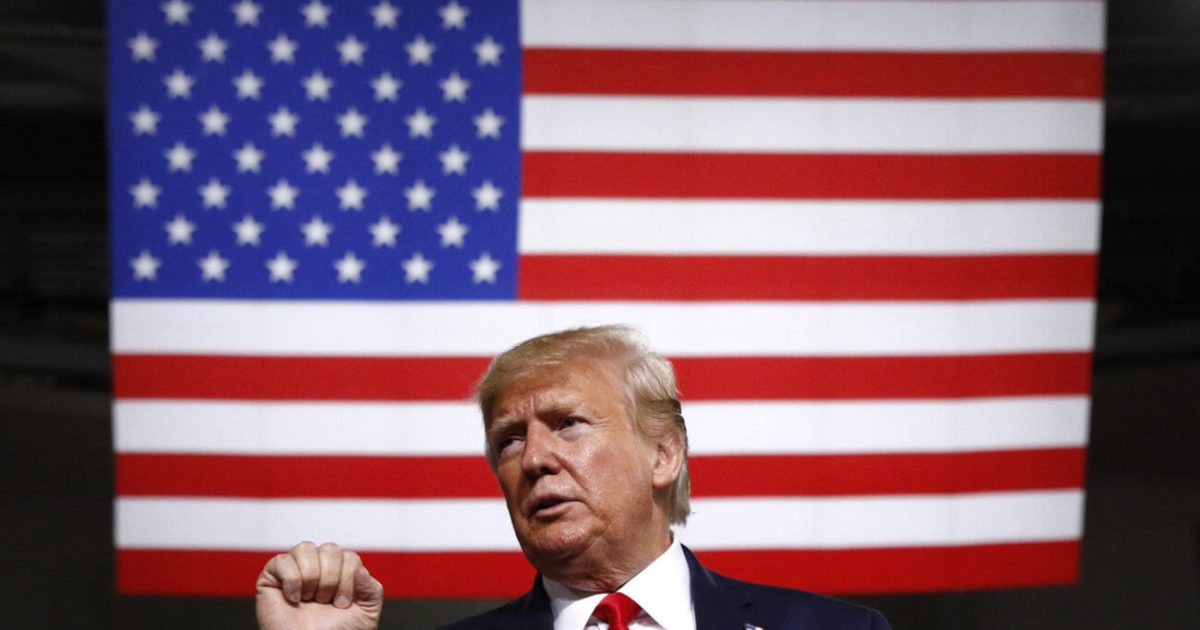- The Dow Jones bled lower on Thursday, reversing part of the previous day’s rally.
- Today’s jobless claims release revealed that almost 40 million Americans have filed for unemployment since the coronavirus pandemic began.
- Investors brushed off this data and appeared more interested in Donald Trump’s escalating war of words with China.
The Dow Jones suffered a moderate setback on Thursday, but don’t blame it on another worse-than-expected jobless claims report.
Although the data revealed that almost 40 million Americans had been laid off in the past nine weeks alone, it was likely that Donald Trump’s tough talk on China was the biggest problem for the Dow.
Dow Bulls Ignore Jobless Claims Miss
All three of the major U.S. stock market indices prepared to close the week’s penultimate trading session in the red:
- The Dow dipped 94.12 points or 0.38% to 24,481.78.
- The S&P 500 slid 0.73% to 2,950.22.
- The Nasdaq dropped 0.86% to 9,295.49.
While U.S. PMI data impressed and housing market statistics came in solid, the main event was the jobless claims figures.
Economists forecast 2.4 million claims, which was pretty much on the money, though the actual figure exceeded expectations slightly.
If you added in federal filings, the figure might have been as many as 1 million claims higher. Despite this, bulls did attempt to buy the unemployment “dip” (a strategy that has worked for the last few weeks).
But the Dow’s momentum faded as investors mulled over the geopolitical ramifications of Donald Trump’s dramatic turn against China.
Trump Puts Stock Market at Risk with China Attacks
Placing the blame for nearly 100,000 U.S. coronavirus deaths firmly on the shoulders of Beijing, the president is doing his best to leverage anti-China sentiment into a political win.
This policy shift is most likely due to the fact the president cannot point to stellar employment numbers or a record-high stock market to win over those crucial pro-Biden voters in battleground states.
The days of being friendly with Xi Jinping appear to be over, but the conflict hasn’t escalated into anything more than a war of words – yet.
The good news for stock market bulls is that Nordea Asset Management Senior Economist Sebastian Galy doesn’t expect this to change.
Galy said in a statement shared with CCN.com that he doesn’t anticipate any real escalation. Why? Because it serves no real benefit to either side.
He explains:
Tensions between China and the United States continue to ratchet up higher following a slow path of escalation, as widely expected given the elections with the U.S. president implicitly blaming the Chinese one. It is in neither [party’s] interest to boil it over, especially in the United States, given the feedback loop in the equity markets.
Cornerstone Macro analysts agree in the near term, but they believe that the future is far less clear.
Trump could grow increasingly boisterous heading into the election, potentially forcing a more dramatic decoupling later on.
US-China relations are at a major inflection point. President Trump will remain in the trade deal he struck with China for now, but maybe not through the election.
It remains to be seen whether the Dow Jones can withstand a return of the “Tariff Man,” particularly with tens of million Americans unemployed.
Dow 30: Boeing & Raytheon Lead as Global Tensions Grow
The Dow 30 was mostly in the red on Thursday, and even heavyweight Apple stock took a slight knock.
Things could have been much worse had it not been for two monster moves from Raytheon Technologies (+3.9%) and Boeing (+4.2%). Once again, Donald Trump and China may have been at the center of these moves.
Both these companies are integral to national security interests. We’ll likely see plenty of government posturing if the U.S. wants to start flexing its muscles, and a new era of cold war-style saber-rattling could be on the horizon.
This article was edited by Josiah Wilmoth.




